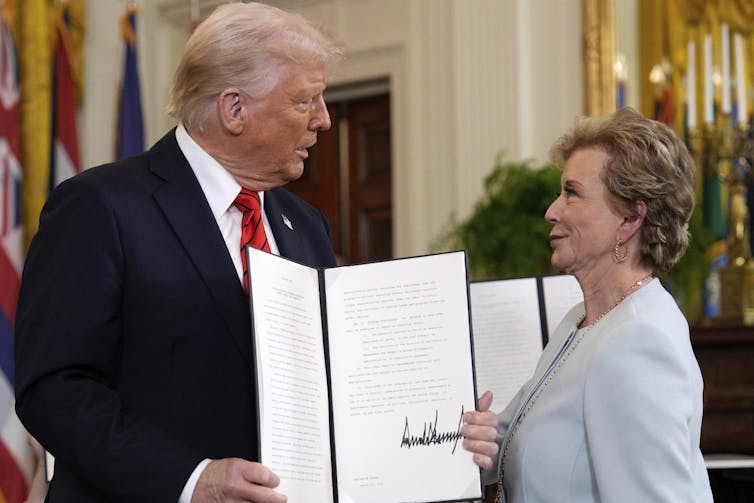Trump has promised to eliminate funding to schools that don’t nix DEI work – but half of the states
Trump’s February 2025 ‘Dear Colleague’ letter instructed all schools that receive federal funding to rid their programming and policies of all DEI ideology, or else risk losing money.

It’s been about six months since the U.S. Department of Education sent a “Dear Colleague” letter to all schools that receive federal funding, warning them that they could risk losing this money if they promote what the department calls “pervasive and repugnant” racial preferences.
The letter, among other things, reversed previous presidents’ positions on how diversity, equity and inclusion influences schools’ disciplinary measures. It advised schools to, within two weeks, begin to eliminate all discipline protocols rooted in DEI, on the grounds that this work is discriminatory against white students.
Trump also issued an executive order, “Reinstating Commonsense School Discipline Policy,” in April 2025, doubling down on the letter.
Trump’s letter and executive order exert an unusual level of influence over how schools can decide the best way to teach and, when necessary, discipline students. It also cuts against recognized research that Black, Latino and Native American students are disciplined more frequently and harshly than white and Asian students.
I am an educational scholar who has spent the past 13 years analyzing school discipline policy. While previous administrations have issued “Dear Colleague” letters to schools, Trump’s is the first that frames itself as though it were law – setting a potential new precedent for the executive branch to issue educational mandates without the approval of the judicial or congressional branches of government.
While all but two states have responded to Trump’s letter, about half of them have said they are not going to comply with its terms – despite the administration’s threat of cutting funding if they do not follow the guidance.

Understanding DEI in education
Equity-oriented education, or diversity, equity and inclusion, refers to an ideology and programming that intend to ameliorate patterns of racial inequality. In the context of discipline in schools, DEI strategies could include teachers having conversations with children about their behavior, rather than immediately suspending them.
Research shows that these techniques can help reduce racial discipline gaps in academic achievement and disciplinary outcomes.
The Obama administration in 2014 recognized this research in its own “Dear Colleague” letter to schools. The administration advised schools to either reform their discipline practices toward nonpunitive alternatives to suspension or risk being investigated for discrimination.
The first Trump administration rescinded this letter in 2018.
Then, in 2023, the Biden administration released a document along the same lines as Obama’s letter.
Trump’s February 2025 letter grouped all of these recommendations under the banner of “DEI” and argued that such practices are discriminatory, privileging students of color over white and Asian students.
In his April executive order, Trump reiterated that if schools did not eliminate DEI, they would be out of compliance with Title VI of the 1964 Civil Rights Act. This act prohibits discrimination on the basis of race, color or national origin,
Public school districts regularly have to issue a certificate of compliance to the government showing that their work is in line with Title VI.
While the Trump administration characterizes DEI as “smuggling racial stereotypes and explicit race-consciousness into everyday training, programming, and discipline,” it does not define exactly what constitutes DEI programming.
This puts school districts at risk of losing funding if they maintain any initiatives related to racial equality.
Legal concerns with Trump’s directives
The executive office and members of Congress typically issue “Dear Colleague” letters, which are not legally binding, to advise schools and others on policy.
Yet Trump’s letter was written like a mandate and reinforced by an executive order, which is legally binding.
Some scholars are calling the letter an “overreach” of legal authority.
In the spring of 2025, I analyzed states’ responses to Trump’s letter and executive order.
Two states, Iowa and Tennessee, had not yet provided public responses.
Twenty-three states complied with the administration’s directive by signing the letter as of May 30. Some, like Oklahoma, not only certified the letter but also passed state laws banning DEI policies and programs.
The remaining 25 states refused to certify the letter, asserting that they already complied with Title VI and that their policies are not discriminatory.
In addition, 19 of those 25 states sued the Trump administration over the letter in April, culminating in a court injunction later that month that temporarily released states from having to comply with its demands.
I noticed that many states that refuted Trump’s letter used the same exact words in their responses, signaling a concerted effort to resist Trump’s directives. States that did not sign on to the letter but objected to its intent generally resisted on legal grounds, ethics or both.
A legal argument
Most states that rejected it grounded their refusal to sign Trump’s letter in federal law. They cited the Civil Rights Act and the Paperwork Reduction Act, which protects states from having to file redundant paperwork. Because these states already certified compliance with Title VI, this argument goes, they should not have to do so again under Trump’s directive.
Education commissioners from a few states, including Illinois and Minnesota, also cited specific language used by Betsy DeVos, Trump’s former education secretary in his first term, who supported DEI policies.
Charlene Russell-Tucker, the education commissioner for Connecticut, also pointed out that in order for the federal government to cancel DEI programming, it would have to first legally change the definition of Title VI.
States resisting on other grounds
Some education officials also argued that their DEI work is ideologically necessary for providing supportive learning environments for all students.
Patrick Tutwiler, Massachusetts’ interim education commissioner, wrote in an April 16 letter, for example, that “Massachusetts will continue to promote diversity in our schools because we know it improves outcomes for all of our kids.”
Other officials displayed more subtle resistance. Randy Watson, Kansas’ education commissioner, for example, affirmed the state’s “commitment to comply with all Federal statutes,” including Title VI – but did not explicitly address Trump’s “Dear Colleague” letter.
Similarly, Kentucky informed the Department of Education of its compliance with federal law, while simultaneously encouraging local districts to continue diversity, equity and inclusion work.
Mississippi’s state department of education pointed out that school districts operate independently, so the state cannot force policies on them. However, Mississippi signaled compliance by citing a new state law banning DEI and confirmed that each of its individual school districts have already certified compliance with federal laws.

More legal pushback
It is not yet clear what might follow the April court injunction, which largely prevented the Department of Education from cutting federal funding to schools that continued their DEI-related programs and policies.
While the Trump administration has made major cuts to the Department of Education, it has not announced that states refusing to certify the letter will lose funding.
This is the first time an administration is issuing such a direct threat to withhold K-12 funding, placing schools in an unknown place, without a clear blueprint of how to move forward.
Hilary Lustick does not work for, consult, own shares in or receive funding from any company or organization that would benefit from this article, and has disclosed no relevant affiliations beyond their academic appointment.
Read These Next
AI’s growing appetite for power is putting Pennsylvania’s aging electricity grid to the test
As AI data centers are added to Pennsylvania’s existing infrastructure, they bring the promise of…
Why US third parties perform best in the Northeast
Many Americans are unhappy with the two major parties but seldom support alternatives. New England is…
Abortion laws show that public policy doesn’t always line up with public opinion
Polls indicate majority support for abortion rights in most states, but laws differ greatly between…






